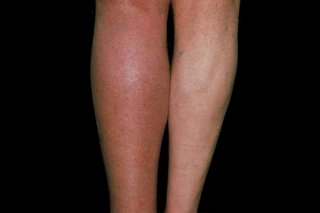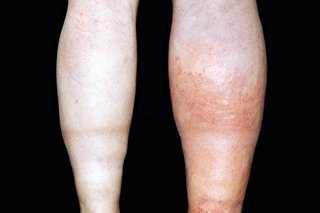Blood clots can be very serious and need to be treated quickly. Staying healthy and active can help prevent them.
Urgent advice: Get advice from 111 now if you think you have a blood clot
Symptoms of a blood clot include:
- throbbing or cramping pain, swelling, redness and warmth in a leg or arm
- sudden breathlessness, sharp chest pain (may be worse when you breathe in) and a cough or coughing up blood
Blood clots can be life threatening if not treated quickly.
111 will tell you what to do. They can arrange a phone call from a nurse or doctor if you need one.
Go to 111.nhs.uk or call 111.
Other ways to get help
A GP may be able to help you.
Ask your GP practice for an urgent appointment.
What a blood clot in a leg can look like


A blood clot in a leg is called a DVT (deep vein thrombosis).
Immediate action required: Call 999 or go to A&E if:
- you're struggling to breathe
- someone has passed out
This could be a blood clot in the lungs (pulmonary embolism), which needs to be treated immediately.
Check if you're at risk of blood clots
Blood clots are rare in young, healthy people.
You're more likely to get them if you:
- are staying in or recently left hospital – especially if you cannot move around much (like after an operation)
- are overweight
- smoke
- are using combined hormonal contraception such as the combined pill, contraceptive patch or vaginal ring
- have had a blood clot before
- are pregnant or have just had a baby
- have an inflammatory condition such as Crohn’s disease or rheumatoid arthritis
There are also other things that increase your risk of clots.
How to prevent blood clots
If you're at a high risk of blood clots – for example, you're in hospital – follow the advice of your care team about preventing clots.
This may involve wearing stockings that improve your blood flow or taking medicine to reduce the risk of clots (anticoagulants).
There are also things you can do to help avoid clots.
Do
-
stay active – taking regular walks can help
-
drink plenty of water to avoid dehydration – you're more likely to get a clot if you're dehydrated
-
try to lose weight if you're overweight
-
wear flight stockings or flight socks to improve your blood flow on long flights – a pharmacist can advise you about this
Don’t
-
do not sit for long periods without moving, if you can avoid it
-
do not drink lots of alcohol – this can make you dehydrated
-
do not smoke
Page last reviewed: 16 February 2021
Next review due: 16 February 2024